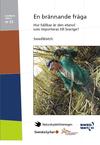2009-04-13
E-waste export, out of control
European countries must initiate control of their ports to stop the illegal export of electronic waste to developing countries.
The amount of e-waste in developing countries has increased rapidly in recent years. This increase is due both to the growing level of consumer electronics in the developing countries themselves, and to exports from rich countries. This study shows that a large proportion of electronic goods that are thrown away in the EU are exported as waste, or second-hand goods, to countries in Africa and Asia where a sustainable recycling system is largely absent.
EU Transport Control Regulations prohibit the export of electronic waste to developing countries, but port inspections in the EU show that exports still exist. The export of used electronics is perfectly legal. On one hand, it increases poor people's access to IT and prolongs product life span, which is good from a global environmental perspective. On the other hand, the products will eventually be discarded in a country without sustainable recycling systems. Metals and plastics are recycled using primitive methods by workers who lack protective clothing and environmental knowledge.
According to Statistics Sweden, a total of over 2 000 tons of mobile phones and over 1 000 tons of desktop computers were exported from Sweden to other countries in 2007. In some cases the export destinations and the average declared values of the loads indicate that they may contain waste or used products of unknown quality and lifespan. This applies to exports of desktop computers to Ethiopia in 2007 (eight tons with an average declared value of SEK 267 per product). The same year, eleven tons of laptops were shipped to Ghana with an average value of SEK 86 per computer. This highlights the need for the Swedish authorities to investigate further exports. Three of four computers that arrive in Ghana from the outside world do not work.

